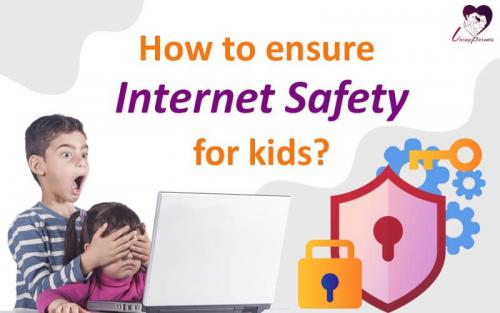Parenting DOs and DON’Ts to Ensure Online Internet Safety for Kids

Using
internet every day has become an integral part of our lives. From using it to
get the work done for office to use it for educational or entertainment
purposes, the uses and the hours spent on our devices are endless. The kids
growing up today is truly a digital generation. They are taught on
smart-boards, and they use computers and laptops to create their projects or
even attend their schools, especially in the times of corona, using the
internet itself. Any school-going kid today is aware of the power of the
internet and is at a stage of exploring its usage to connect further with the
community. During the school-going age, the kids are naïve and impressionable
and might come across content and people on the internet that might be
emotionally, psychologically as well as physically dangerous to them. As a
parent, it is of paramount importance that you create a plan for online internet safety for kids.
Importance of Internet Safety for Kids
Children
might feel excited to explore the world of social networking and online
shopping but these avenues are full of phishing scams and predators. An
unsupervised kid can make mistakes with ever-lasting repercussions, which is
why there must be a set of internet safety for kids to surf the internet.
1. Impressionable Content
Children
are inquisitive by nature and not having internet safety for kids in place can
lead them to get exposed to content like pornography on the internet. This can
leave them shocked and also feel embarrassed. With time, they might become
overtly or generate sexual tendencies before time.
2. Cyber-bullying
Bullying
has been a part of society ever since, but with the advent of technology, it
has become very easy to bully anyone, anywhere. Cyberbullying is defined as the usage of
cell-phone, laptop, computers to create, post, text information that is
embarrassing and hurtful to someone. Cyberbullying allows people to hurt others
easily as they do not have to face the consequence of doing it face to face,
which makes them even bolder. Technology helps them to bully anyone stealthily.
It is easier to impersonate someone or create fake pictures and videos and
spread them online.
3. Cat-Fishing
The
word cat-fishing refers to scam run by predators on the internet when they
create fake profiles pretending to be someone else. They can create accounts on
social media pretending to be relatives, friends or kids of the same age.
Generally, these predators start talking to kids to groom them to get sexual
favors.
4. Phishing
Some of
the predators might just want your financial information to conduct a phishing
scam. They might lure your children into giving them your credit card
information or passwords to the home security system to rob you financially or
rob your house as well.
Online Internet Safety for Kids
With
the internet available easily everywhere, parents need to create an online
internet safety for kids and follow the steps and pointers to help them stay
safe. Some of the steps have been mentioned below to help you through this
situation.
1. Talk to Your Kids
One of
the first and foremost steps to ensure online internet safety for kids is to
make them understand the issues related to internet safety tips. Until and
unless they understand the problems and how they might get scammed or lured
into sexual favors, they won’t openly communicate with you in case they face
the situation. If you see a change in their behavior or an obsession with
pornography, take a thorough look through their computers and chats on various
apps like Facebook, Snapchat, Badoo. If you find a sexual predator or a
scammer, talk to police immediately to report the predator.
2. Supervise Internet Surfing
An
easy-to-follow internet safety for kids is to make a rule that kids cannot surf
the internet without the supervision of an adult. Also, internet-surfing should
be done in open areas like a living room or kitchen when you or someone else
can keep an eye on the content they are consuming.
3. Set Internet Surfing Time
To make
sure that the kid doesn’t get addicted to using the internet, set a time during
which they can use the internet services, that too under supervision.
4. Teach Them About the Importance of Privacy
Teach
your kids that they should never share their private information like address,
phone number, details about the family, credit cards, passwords with anyone.
Don’t forget to tell them the kind of repercussion the sharing of the
information might cause.
5. Teach Them Not to Meet Any Online Friends
Tell them
about how people can create a fake profile to lure them into meeting the
potential pedophiles or kidnappers. Make a rule that they mustn’t agree to meet
an online friend face-to-face.
6. The Dangers of Pop-ups
Instruct
the children to not click on any pop-ups while surfing the internet. This can
lead to a phishing website causing hacking of your system or loss of important
financial information.
7. Set a strong password
To stop
them from using devices in your absence, make sure to set a strong password for
all the digital devices, your home security systems and financial information
regularly.
8. Monitor Their Online Postings
Make
sure to monitor what your child is posting online. This will help you ensure
that they are not getting bullied or are bullying someone else online.
Stay Cautious
The
online security of kids is of utmost importance, and you need to take these
above-mentioned steps to keep your kids safe. Make sure you monitor the content
they are consuming as well as posting, and that they are using the internet for
educational or entertainment purposes under supervision only. Keep the lines of
communication open and talk to them about the dangers of the internet in
detail.
Post Your Ad Here
Comments